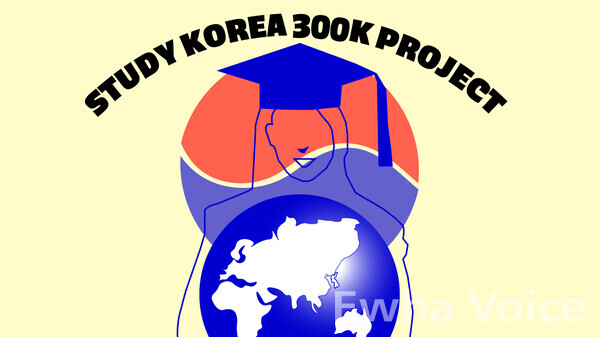
On Aug. 16, the Ministry of Education proposed the “Study Korea 300K Project,” a government-backed initiative to secure an additional number of international students and help them settle in South Korea with a guarantee of stable jobs. The project aims to increase the number of international students in South Korea to 300,000 by 2027, which is approximately twice the current estimate of 160,000.
The two underlying factors behind the “Study Korea 300K Project” are to combat the decreasing population in South Korea and to nurture global talent in advanced technology and manufacturing.
More specifically, Gyuchan Kim, an associate professor from the Department of Multicultural Studies at Gangneung Wonju National University, explains that the project can be understood from two perspectives: education and immigration.
South Korea’s shrinking population means a decline in college enrollment, which is especially critical for rural universities since domestic students largely prefer to study in Seoul for job opportunities. Kim stressed that a collapse in rural schools affects the surrounding communities. As for immigration policies, the government hopes that international students would earn an academic degree while gaining Korean language proficiency and successfully settling in South Korea.
“In short, international students would not only maintain the current demand of students in schools but also take part in communities in different regions as another helpful workforce in the future,” Kim said.
Despite these potential advantages, there have been less favorable reactions to the project, especially over loosening some requirements in order to secure an additional number of students from abroad.
In fact, the Ministry of Education has proposed to lower the standards to pass the Test of Proficiency in Korean (TOPIK) in order to meet the expected number by 2027. Currently, a minimum score of level three – with level six being the highest – is required for undergraduate programs, while a minimum score of level four is needed for graduate programs.
In a survey of 51 Ewha students conducted by Ewha Voice from Aug. 25 to Sept. 5, 52.9 percent of the respondents disagreed with the plan to lower the standards. Many of them were concerned about the decrease in competitiveness among international students.
Wan Hongyu graduated in 2022 from a joint masters and Ph.D. program in the Graduate School of Economics at Yonsei University Wonju Campus, is one of the students who strongly condemns lowering standards for international student acceptance. Recalling her time as an international student from China, Wan insisted that lowering the standards would make it difficult for the international students to adapt in South Korea.
“A minimum of level four in TOPIK is needed to interact with people in South Korea without difficulty,” Wan said.
On the contrary, Kinal Kim, an international student from Cambodia, expressed his agreement with the government’s initiative to lower the language requirements. However, he argued that more programs are needed where international students can practice speaking Korean.
Kim first obtained his bachelor’s degree in mechanical engineering at Inha University and is currently in the second year of his master’s degree at the same school. The biggest obstacle he faced while studying in South Korea was the language barrier. Although he obtained level four in TOPIK through a language center, speaking in Korean was a different challenge.
“The teaching system did not focus on speaking, and I did not have enough chances to speak Korean,” Kim said. “So, I think the language requirements can be lowered but with more focus on speaking.”
The government has also declared a career-related support for international students, focusing on students in the fields of science and technology. The main goal towards this approach is to encourage their settlement in South Korea. As a result, a fast-track visa system was introduced, which shortens the visa delays to obtain a permanent residence or a Korean citizenship in three years instead of six for those who have earned a master’s degree or Ph.D. within the country.
As a student studying in the STEM field, Kim had positive feedback on this new system. However, he also emphasized the need for improvements in the job-search process.
“The government should make it more accessible and convenient to look for jobs, such as by updating their English websites,” said Kim. “Also, a foreigner-friendly working environment should be ensured.”
On the other hand, the survey conducted by Ewha Voice showed that views about providing additional job-related support for international students were sharply divided: 45.1 percent agreed with the government’s initiative while 49 percent disagreed with the plan.
Professor Kim emphasized the social environment as a factor to encourage the settlement of international students. The decision on whether to settle in South Korea depends on how open people are towards the versatility of foreigners.
“In order for South Korea to become a desirable place to study abroad, it is important to create a welcoming environment for international students,” Kim concluded.

